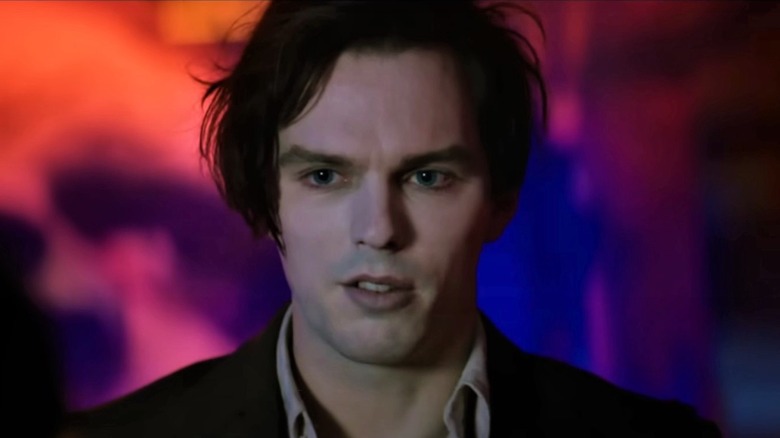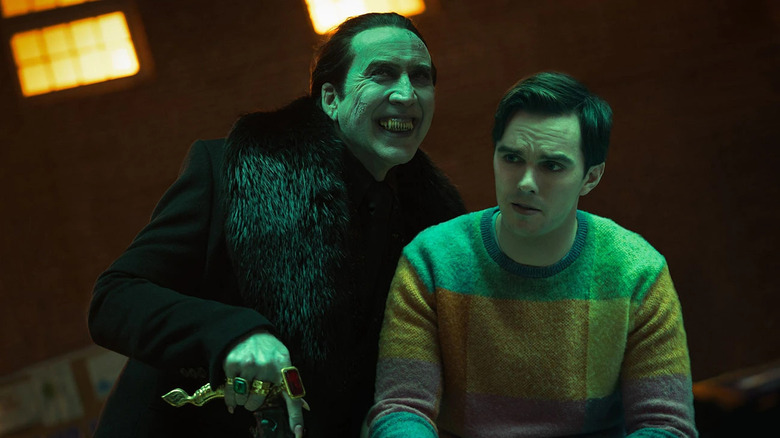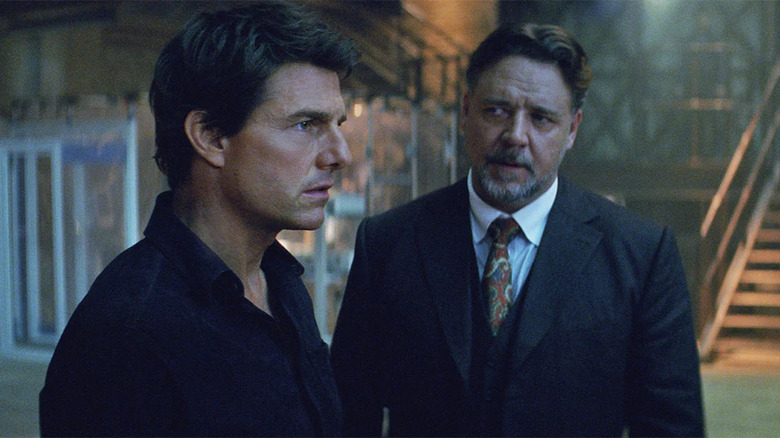Renfield Director Chris McKay Thinks He Knows Why The Dark Universe Fell Apart [Exclusive]
On May 22, 2017, nothing particularly important happened. That wasn't the initial plan, however — at least not according to Universal Studios. That was the day where, on the eve of the premiere of director Alex Kurtzman's "The Mummy" starring Tom Cruise, the studio's official Twitter account for their planned Dark Universe series of films tweeted out a now-ironically iconic photo of the movie stars who were slated to form the cornerstone of Universal's hoped-for Marvel Cinematic Universe competitor.
In the photo, Cruise (The Mummy), Russell Crowe (Dr. Henry Jekyll), Javier Bardem (Frankenstein's Monster), Johnny Depp (The Invisible Man) and Sofia Boutella (uh, The Mummy, also) are awkwardly posed together, likely Photoshopped against a dull, dark background. It's a photo that almost seems to scream, "We'll figure this out later." But "later" sadly never arrived for the Dark Universe. When "The Mummy" opened on June 9, 2017 and earned hardly half of its $410 million budget back, the Dark Universe was forever doomed.
Fortunately for fans of the classic Universal Monsters, Universal was quick to pick up the pieces of their shattered plans, producing a fantastic new imagining of "The Invisible Man" in 2020. While the pandemic complicated plans to immediately follow up on that film's modest success, the Universal Classic Monsters ball has begun rolling again with the upcoming release of director Chris McKay's "Renfield," a horror-comedy centering around Dracula's titular put-upon familiar. McKay is well aware of why the Dark Universe concept went wrong, and it all has to do with that common mistake of putting the shared universe cart before the box office horse.
McKay made sure Renfield didn't fall victim to the Dark Universe bite
During an exclusive interview with /Film's Jeremy Mathai, McKay explained how he was enticed and relieved to discover that "Renfield" was its own movie and not a new attempt at a cinematic universe. "When I read the script, it felt like it was a standalone thing. No one ever talked about doing anything other than that," said the director.
McKay was quick to point out that his desire to make "Renfield" a standalone project isn't out of disinterest in the other Universal Monsters, but rather that it helps the film focus on the right things at the right time. As he elaborated:
"I love these characters and I think there's a lot more. Sure, you could absolutely tell more story in [box office] success, but we wanted to tell a self-contained thing. I think that everyone, even if you are in a Marvel universe or a shared universe situation, you should always just focus on that movie. Make a good version of that movie, regardless of whether it's a sequel or the trilogy or whatever, just concentrate on that."
Speaking to the Dark Universe issue specifically, McKay again clarified that the characters and material aren't the issue, but rather the approach:
"I think sometimes where movies go wrong is where they're trying to do too much. The Dark Universe thing could've worked there. There's compelling ... who wouldn't want to see Angelina Jolie play Bride of Frankenstein or Javier Bardem play Frankenstein's Monster? That would be really cool. I think, when you try to also do all these other things and you haven't established what the tone is, what the world is, I think that's where things go wrong."
Let a cinematic universe happen naturally
As the MCU continues to toil forward (with diminishing returns), it's hopefully becoming clearer to Hollywood that the franchise's heyday of success was more alchemy than science. After all, given the mess that was made of the DC Extended Universe, it's evident that trying to follow the Marvel blueprint too rigidly is often a recipe for disaster.
If it ain't broke, don't fix it, as the old saying goes, and there happen to be many examples of cinematic universes that developed naturally which have been far more successful. Sure, the View Askewniverse of filmmaker Kevin Smith didn't do MCU numbers in its time, but it pleased a lot of fans of those movies, and Quentin Tarantino's fans still salivate over the little Easter eggs that connect his work.
Ironically, the best example of how waiting to establish a shared universe can be successful lies right under Universal's nose. The original cycle of Monster films from the 1930s and '40s only started crossing over its characters beginning with 1943's "Frankenstein Meets the Wolf Man," which happens to be the fifth in the "Frankenstein" series, the second in the "Wolf Man" series, and the 12th (depending on how you count) Universal Monsters entry overall.
While it's understandable that the promise of huge amounts of money would cause the major movie studios to make foolhardy choices, the secret formula remains the same as it always has been: Make good art and the fans will follow. The studios could learn a lot from Dracula himself: If you focus on one person at a time, you may soon happily find yourself surrounded by a legion of followers at your command.


